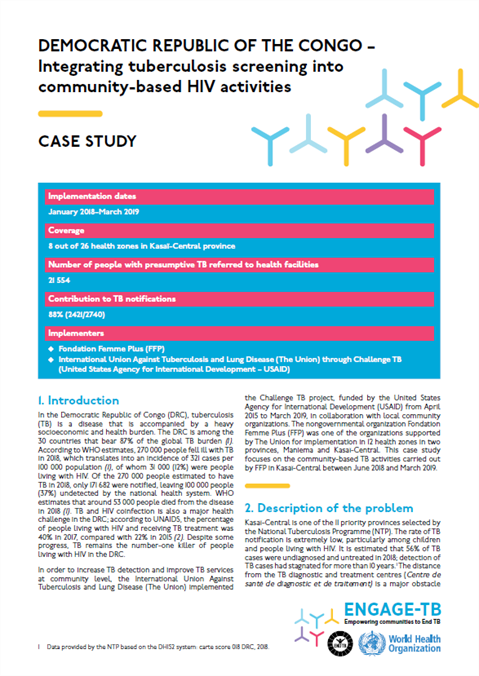Democratic Republic of Congo (DRC) – Integrating tuberculosis screening into community-based HIV activities
Case study

Overview
In the Democratic Republic of Congo (DRC), tuberculosis (TB) is a disease that is accompanied by a heavy socioeconomic and health burden. The DRC is among the 30 countries that bear 87% of the global TB burden (1). According to WHO estimates, 270 000 people fell ill with TB in 2018, which translates into an incidence of 321 cases per 100 000 population, of whom 31 000 (12%) were people living with HIV. Of the 270 000 people estimated to have TB in 2018, only 171 682 were notified, leaving 100 000 people (37%) undetected by the national health system. WHO estimates that around 53 000 people died from the disease in 2018 (1). TB and HIV coinfection is also a major health challenge in the DRC; according to UNAIDS, the percentage of people living with HIV and receiving TB treatment was 40% in 2017, compared with 22% in 2015 (2). Despite some progress, TB remains the number-one killer of people living with HIV in the DRC.
In order to increase TB detection and improve TB services at community level, the International Union Against Tuberculosis and Lung Disease (The Union) implemented the Challenge TB project, funded by the United States Agency for International Development (USAID) from April 2015 to March 2019, in collaboration with local community organizations. The nongovernmental organization Fondation Femme Plus (FFP) was one of the organizations supported by The Union for implementation in 12 health zones in two provinces, Maniema and Kasaï-Central. This case study focuses on the community-based TB activities carried out by FFP in Kasaï-Central between June 2018 and March 2019.
